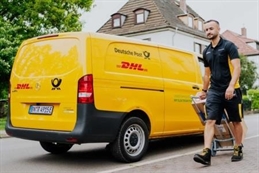
Postal companies in Europe, North America, Oceania, Africa and Southeast Asia—which have worked together since 2008 initially through the jointly founded Environmental Measurement and Monitoring System (EMMS) and since 2019 through the Sustainability Measurement and Management System (SMMS)—have reported lowering their annual CO2 emissions by almost half through these efforts.
"Since the start of their cooperation in 2008, these postal companies have reduced their total annual CO2 emissions by nearly 40%," DHL said in a statement.
"By 2030, their goal is to lower CO2 emissions by an additional 50% compared to 2019, with 75% of energy consumption in their own buildings supplied by renewable energy sources," it added.
Deutsche Post and DHL in Germany efforts
DHL Group, with its Post & Parcel Germany division, noted that it is even more advanced on this front.
The 30,000 electric vehicles deployed in their operations make up 44% of their German fleet. DHL said this percentage will increase significantly by 2030, with plans to achieve a figure of 80 to 90%.
The logistics company noted that reducing long-haul transport emissions remains challenging, as electric trucks with sufficient range are hardly available, charging infrastructure still does not provide nationwide coverage, and the trucks themselves remain extremely/hugely expensive.
"This is why DHL Group is currently focusing on Bio-CNG trucks as a transitional technology, with plans to purchase over 450 such trucks in Germany by the end of 2024," DHL said.
It noted that other alternative drive systems, such as hydrogen and HVO-powered vehicles, are already being tested and will increasingly be deployed in the next several years.
Deutsche Post and DHL are also investing in their vehicle fleet and renovating and building new operations sites, such as delivery bases equipped with photovoltaic systems, heat pumps and building automation, to reduce CO2 emissions.
The percentage of electric power from renewable energy sources used in the German mail and parcel business is 95%.
"International cooperation among postal companies on climate protection is also important for our customers sending shipments abroad because they expect reduced CO2e emissions along the entire route from sender to recipient, not just for portions of the route," commented Tobias Meyer, CEO DHL Group, noting that the industry also needs "uniform standards" and good regulation in the area of sustainability like the so-called 'Book & Claim' to help customers reduce their Scope 3 emissions.
"Working together as an industry is the only way to achieve this. Postal companies are making huge investments to transport mail and e-commerce shipments more sustainably. Hence the call to our customers: Take advantage of the transport offers with CO2e reduction," Meyer added.
Postal company priorities globally
Meanwhile, in line with Sustainable Development Goal (SDG) 17 — "Partnerships for the Goals" — postal companies worldwide are focusing on partnerships for sustainable development.
DHL said these partnerships span companies in Europe, North America, Oceania, Africa and Southeast Asia — allowing postal companies to benefit from each other's experiences and drive further progress towards their sustainability targets.
The report cited long-term trends in the industry moving forward, including circular economy which includes things like reducing fuel consumption and providing facilities in postal outlets for returning empty packaging; and decarbonizing long-haul transport to reduce the sector's environmental impact.
"Today, several postal companies, including DHL Group, deploy electric trucks for long-distance transport. Postal companies are also working on additional innovations in sustainable fuel options for air freight," the report added.
Green Postal Day was established in 2019 by the CEOs of the postal companies participating in the IPC Sustainability Measurement and Management System (SMMS) to highlight the environmental and business advantages achieved by the postal industry over the past ten years by cooperating as a sector to reduce CO2 emissions.
DHL said 26 postal companies from North America, Europe, Asia, Africa and Oceania take part in this program.



